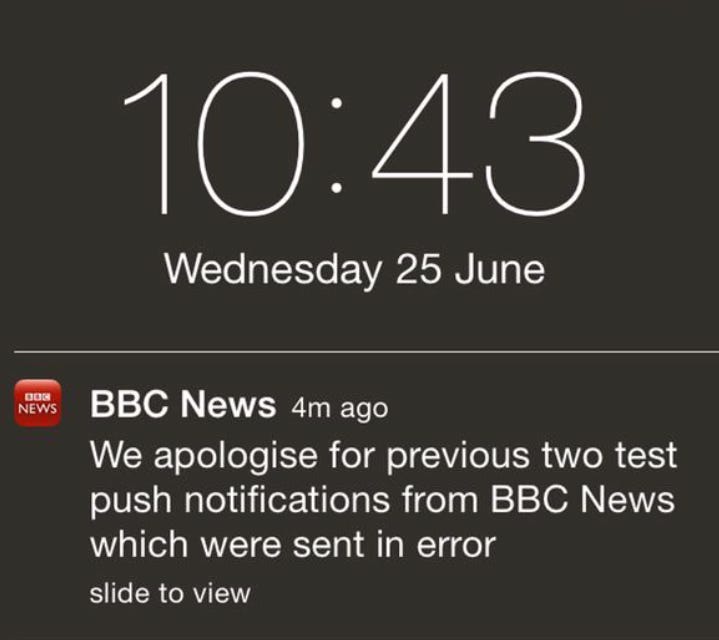The BBC Push-Alert Problem: What 219 Notifications Revealed
Most media criticism focuses on headlines, broadcasts, or major editorial decisions. But during a recent Breaking Battlegrounds discussion, Gordon Rayner highlighted a different—and quieter—indicator of bias: the BBC’s push notifications. These alerts reach seven million users and serve as the broadcaster’s real-time signal of what matters most. A newly examined memo suggests those signals have not been neutral.
The Memo’s Discovery: 219 Alerts, One Distinct Lean
The advisor behind the memo conducted a targeted analysis of BBC News app push alerts for September 2023. The goal was simple: examine what stories were prioritized for millions of users. The findings were not.
Across 219 news alerts, the distribution of topics didn’t match the scale of events happening in the UK that month. Instead, it reflected a heavily narrowed view of the news landscape.
Key observations from the memo:
Only four alerts out of 219 had anything to do with immigration.
Immigration was one of the most debated issues in the country during that time.
Of those four alerts, three focused solely on poor conditions for migrants, without addressing broader trends or policy angles.
Not a single push alert mentioned the record number of illegal small-boat arrivals, despite it dominating national discussion and official data.
Meanwhile, twelve alerts—triple the amount devoted to immigration—highlighted developments involving comedian Russell Brand and the allegations surrounding him.
The numbers were not subtle. They suggested an editorial pattern that elevated certain topics while downplaying others, despite their national significance.
Why Push Alerts Matter More Than Ever
Chuck Warren pressed Rayner on the significance of this finding. The issue goes beyond topic selection. Push alerts are immediate, unfiltered touchpoints. For many users, they are the news—shaping perception long before they open an article or turn on a broadcast.
When a public broadcaster with government funding steers real-time news updates in one direction, the effect is multiplied. The memo’s author argued that the imbalance wasn’t accidental—it reflected decisions that consistently tilted coverage toward some narratives and away from others.
What the Memo Suggested—And Why It Was Concerning
According to Rayner, the memo wasn’t written by an activist or a political rival. It came from someone tasked with evaluating impartiality. He and a colleague noticed the skew, documented it, and raised it internally. Their concern wasn’t ideological—it was structural.
The conclusion was direct: the push-alert choices didn’t reflect the full scope of the news being covered or the reality unfolding in the country. Instead, the alerts painted a narrow picture of what the BBC considered “breaking” or worthy of immediate attention.
Transcript
Chuck Warren: So, okay, there’s much is coming out on this memo as well. So for example, there’s a story out today you have about their app that they suppress certain news notifications. Can you tell our audience about what BBC is doing on that with government money?
Gordon Rayner: Yeah, so this again came out of this memo to the board. So the author and another chap that he was working with had done quite a lot of analysis of various parts of BBC output. And one of the things they had looked at was the BBC News app, and in particular the push notifications that they sent out to their seven million users.
And they just looked at what those were. they put out something like 219, I think it was, news alerts in the month of September 2023. So they took that as a sample. And what they were finding was that whoever was in control of those alerts was giving a very partial view of what the news was, either the news of the day or even just the news that BBC was covering.
So for example, they were very surprised to discover there only four of those 200-odd news alerts was anything to do with immigration, obviously immigration being one of the big topics in the UK right now. And of those four, three of them were about what awful conditions migrants have to live in when they get to the UK. In the same period, Boron migration, 12 on a comedian called Russell Brand, who had gone himself into trouble over sexual harassment.
He’s currently awaiting trial. And what, incidentally, in that particular month, there had been a record number of people arriving in small boats across the channel, arriving illegally. That wasn’t mentioned at all in the news alerts.
Listen to the full episode of Breaking Battlegrounds anywhere you stream your podcasts!


